- Homepage
- Easy LUNCH
- Winter Salad With Sourdough Bread
Winter salad with sourdough bread
This winter salad with sourdough bread is for folk whose intestines demand plenty of fibre all year-round; that's most of us, with a tangy kefir dressing to support the microbiome.
We look to foods that don't just taste pretty good but will make sure that we also have happy tums. Gone are the days when we ate "delicious" meals and then sat up half the night groaning with indigestion; and next morning with a compacted, grumpy colon.
Two of the joys of sourdough bread are that it keeps so much longer and is perfect for a pan-fry; it also deals with the gluten issues that some of us may have. Yes, you can have your cake and eat it but you may have to learn how to bake a decent loaf yourself; it's not rocket science.
Ingredients
- 2 slices of stale sourdough bread
- A large handful of deveined-greens
- 1 whole lime
- Any green legumes in season
- A cup of your favourite herbs
- Half a cup of olive oil
- 1/4 cup kefir or buttermilk
- A handful of spring onions
- A handful of toasted-almonds
- Black olives
- Feta cheese
Go for it
- Pour 2 TBSP of olive oil into a large pan; when hot, gently fry the bread for five minutes, 2 more on the other side until golden-brown.
- Stick-blend the peeled lime, garlic and kefir. Add 2 TBSP olive oil and whisk further; S&P.
- Blanche the chopped greens for a minute or two; add the peas. Mix well with the dressing.
- Add the sliced spring-onions, almonds and olives. Sprinkle with the herbs.
- Add chunks of the toasted sourdough, toss until well-soaked in the dressing.
- Spoon chunks of feta and the olives on the salads.
Pan-fried toast
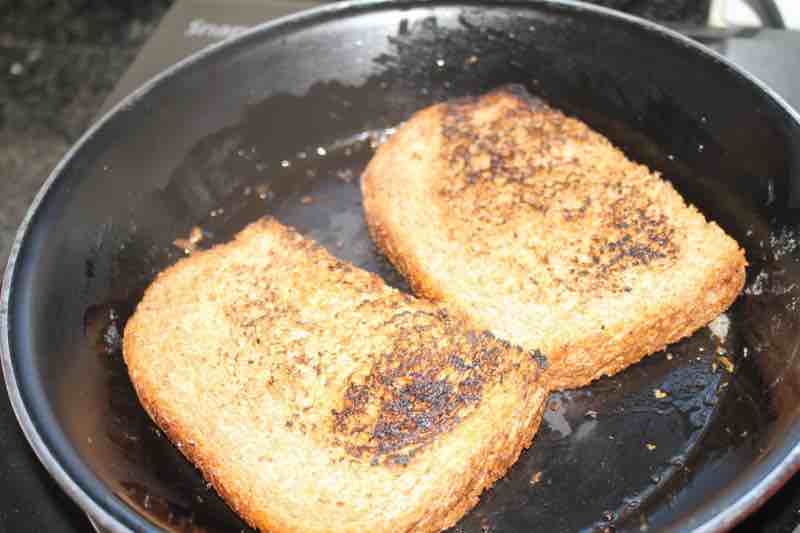
Once you grasp that refined flour and sugar are the great enemies, you can enjoy pan-fried toast without guilt; have no fear of real bread and the good fats. They provide incredible satiety and actually contributes to weight loss; that's the beauty of whole grains.
But nutritionists glibly state that we must eat more whole grains and cut back on seed oils, ignoring that it's almost impossible for those relying on grocery store food. We eventually bought our own small mill for flour and grits.
In-season greens and other veg
Since we are gardeners every recipe is adapted to whatever is in season. In summer you could use a cucumber instead of peas; we often enjoy young podded fava-beans, simmered gently for about five minutes. Never skin them; without the fibre they become highly glycemic.
But in our mild winters it is kale, spinach and rocket most often. These are the greens that eaten daily keep us regular.
Did you know that a tablespoon of olive oil daily reduces heart disease by 18%? It's medicine.
Ever since kefir fixed my severe 15 year bellyache from a helicobacter infection that was threatening to give me an ulcer, we use it daily with our food. Drug-resistant bugs are a serious issue in these times. The probiotic might be in a dressing like this winter salad with sourdough bread; more often than not in a smoothie.
This all raises a central issue. Do we eat food for function or for pleasure? Obviously one aims for both but if I had to choose, wellness would always come first. A moment on the lips but I have no desire to be saddled with poor health from a sweet tooth; or a longing for ultra-refined commercial bread rolls.
Kale
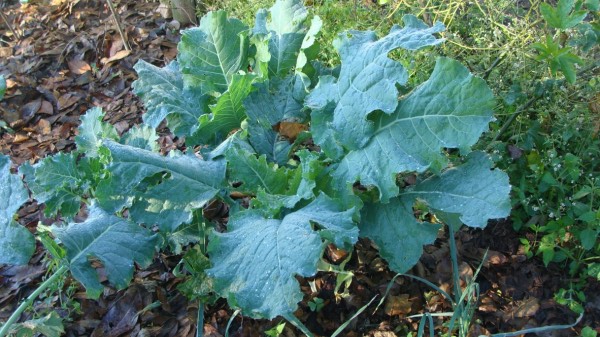
Kale is one of those dark-green leafy vegetables that many find abhorrent. Fresh young leaves are just fine; but those that are old after sitting on the grocer's shelves for several days become simply awful. The plants are not difficult to grow[3].
Whole grains
Nutritionists blithely admonish us for not eating whole grains, failing to mention just how difficult they are to acquire. The bread industry is founded on a big fat lie; millers are allowed to remove up to 51% of the goodies and still describe their product as complete and unrefined.
Eventually we realised that if we wanted to enjoy old age without medication, pain and disability then our own mill was a non-negotiable; the 100% true wholemeal is at the top.
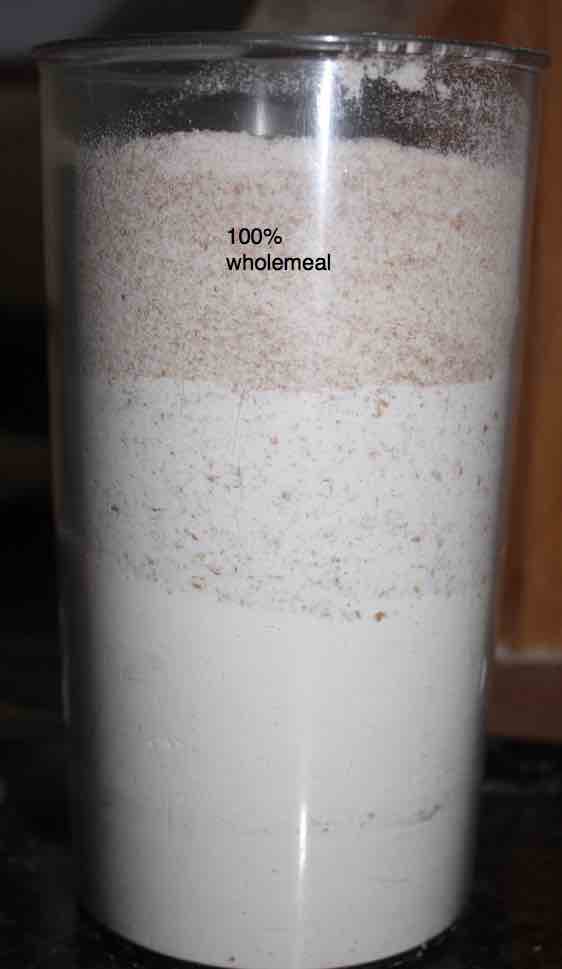 True wholemeal versus the fake
True wholemeal versus the fakeIn the centre is a commercial "wholemeal" and below all-purpose flour. Millers extract much of the bran, the important fatty acids and most of the vitamins; the minerals and invaluable phytonutrients like lignans too.
Sourdough bread
Bake your own sourdough loaf; it takes only five minutes to prepare if you have a bread-machine.
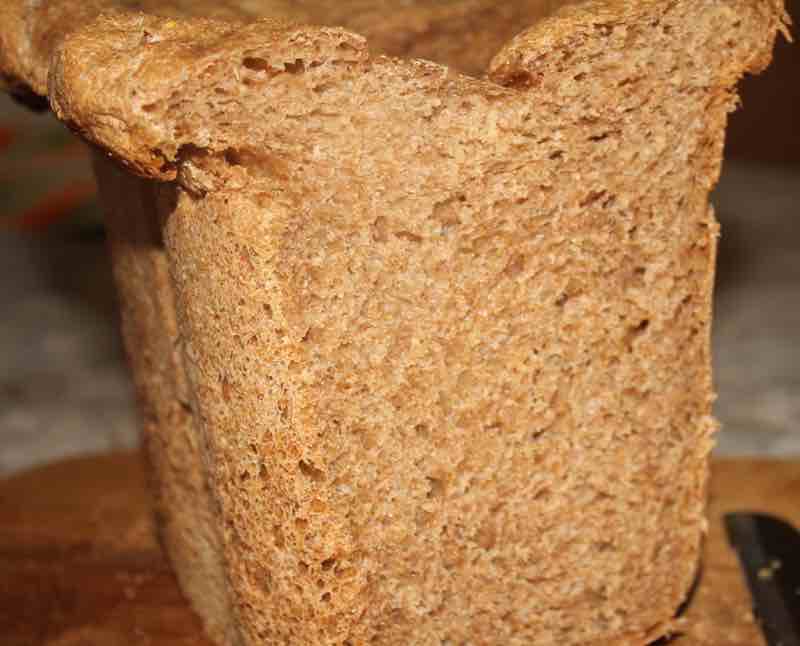 True wholegrain sourdough bread is not heavy
True wholegrain sourdough bread is not heavyThe fibre, extra protein and important fatty acids all contribute to what is known as satiety; stomach emptying is slowed and the release of sugars into the blood stream is inhibited.
Longevity
At the centre of this way of living is a belief that we either spend time growing and preparing wholesome food, or far more consulting doctors and swallowing pills. Plenty of fresh air and exercise come into the equation too, obviously.
So far it's been a success; in our eighth decade neither of us take any drugs nor have consulted medical doctors for over a year; and then only for benign skin lesions. In our early days we, like mad dogs and Englishmen[1] spent too much time in the midday sun without hats; plenty of vitamin D but lucky to have escaped the dreaded melanoma.
Perhaps that was because of the capsaicin in peppers that we consume daily.
All of this is central to the longevity diet proposed by two eminent gerontologists after profound and long research[2].
Almonds and pecans
The research is unequivocal; almonds and pecans are extremely healthy. Nuts lower blood pressure, provide more essential fibre for the alimentary canal and keep the microbiome happy.
There is a caveat however; how many should you enjoy? Research shows that obese people eating 50 almonds per day put on more weight, overall worsened insulin-sensitivity and raised blood glucose[4].
50 almonds per day is simply over the top. Of course they put on weight; just too much of a good thing. It's one of the reasons we like to crack our own nuts; you cannot eat so many.
Enjoy a glass of mead with your meal
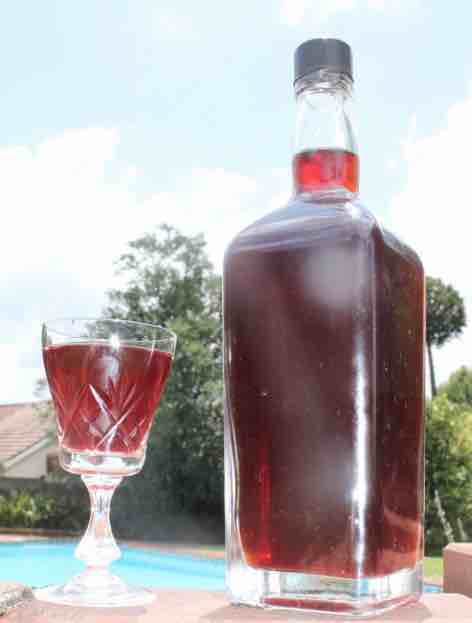
Disturbing research reveals that even one glass of commercial wine per week increases the risk of cancer; especially of the breast and prostate gland. Yet folk in the Blue Zones enjoy quite a lot of unpasteurised alcohol daily with their meals; and ten times as many live to enjoy vigorous old age.
You will probably have to learn how to brew it yourself; and keep a beehive or two. Unpasteurised wines, beers and meads are also powerful probiotics; alive with friendly yeast cells.
Winter salad with sourdough
Winter salad with sourdough bread supplies whole grains and greens, both absolutely essential if we desire to enjoy good years in our dotage.
When browsing use right click and "Open Link in New Tab" or you may get a bad gateway signal.
The material expressed on this page is gleaned from the nutritional and environmental literature; it is clearly referenced. A plain distinction is made between the author's opinion and that which is scientifically proven. When in doubt consult your health professional.
To suggest a correction or clarification, write to Dr Bernard Preston here. Contact.
Newsletter
Our newsletter is entitled "create a cyan zone" at your home, preserving both yourself and Mother Earth for future generations; and the family too, of course. We promise not to spam you with daily emails promoting various products. You may get an occasional nudge to buy one of my books.
Here are the back issues.
- Lifestyle and ideal body weight
- What are ultra-processed foods?
- Investing in long-term health
- Diseases from plastic exposure
- Intensive lifestyle management for obesity has limited value
- A world largely devoid of Parkinson's Disease
- The impact of friendly bacteria in the tum on the prevention of cancer
- There's a hole in the bucket
- Everyone is talking about weight loss drugs
- Pull the sweet tooth
- If you suffer from heartburn plant a susu
- Refined maize meal and stunting
- Should agriculture and industry get priority for water and electricity?
- Nature is calling
- Mill your own flour
- Bake your own sourdough bread
- Microplastics from our water
- Alternative types of water storage
- Wear your clothes out
- Comfort foods
- Create a bee-friendly environment
- Go to bed slightly hungry
- Keep bees
- Blue zone folk are religious
- Reduce plastic waste
- Family is important
- What can go in compost?
- Grow broad beans for longevity
- Harvest and store sunshine
- Blue zone exercise
- Harvest and store your rainwater
- Create a cyan zone at your home
Did you find this page interesting? How about forwarding it to a friendly book or food junkie? Better still, a social media tick would help.
- Homepage
- Easy LUNCH
- Winter Salad With Sourdough Bread
Address:
56 Groenekloof Rd,
Hilton, KZN
South Africa
Website:
https://www.bernard-preston.com